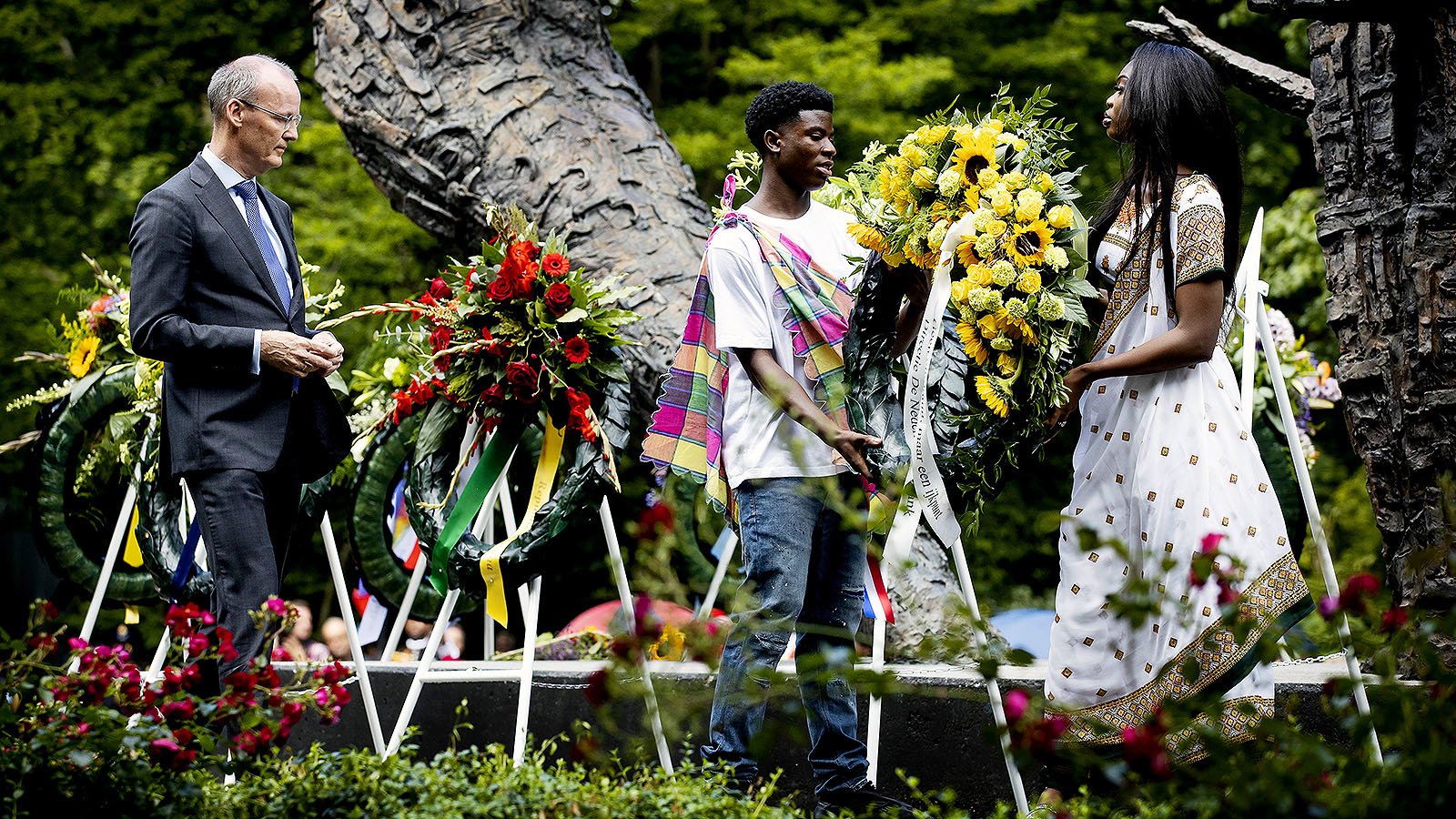DNB’s historical links to slavery: apologies and measures
De Nederlandsche Bank (DNB) apologises for its role in the Atlantic trade in enslaved people and for the effects that continue to be felt even today. We are also taking measures aimed at eliminating the consequences of slavery for those directly involved in the Netherlands, Suriname, Bonaire, Sint Eustatius, Saba, Aruba, Curaçao and Sint Maarten.

© ANP
Apologies and measures
DNB apologised on 1 July – Keti Koti – for its role in the Atlantic trade in enslaved people. We are also taking measures to repair the suffering caused by slavery and to address the repercussions of slavery that continue to be felt today. We are doing so after several months spent reflecting on the scholarly study into our historical links to slavery and following many conversations with people who have a voice in the contemporary debate on this topic. An external focus group provided support in our process of reflection on the study, the apologies that are now forthcoming and the measures that we are taking. This focus group operated independently of DNB. Read the focus group’s report here.
Why apologise?
DNB acknowledges that our organisation was involved in slavery between 1814-1863. For example, part of our start-up capital was derived from the proceeds of slavery. We also recognise that many prominent DNB officials earned money from slavery. Many defended slavery’s existence and its prolongation. Later, many disregarded the consequences of slavery for a long time. And when slavery was abolished, DNB paid compensation to plantation owners on behalf of the Ministry of Colonies, including to DNB board members.
For these reprehensible facts, we apologise to the descendants of enslaved people in the Netherlands, Suriname, Bonaire, Sint Eustatius, Saba, Aruba, Curaçao and Sint Maarten. Our discussions with descendants of enslaved people and with advocacy groups made very clear to us how important it is to apologise. Apologies are an important step in acknowledging the past, learning from it and applying those lessons as we move forward. Apologies are important for all who now bear the consequences of our historical links to slavery.
Sustainable prosperity for everyone
DNB aims to achieve financial stability and sustainable prosperity for all. This means that everyone should be empowered to participate fully in society. In our society today, however, we still encounter the racism, exploitation and discrimination that defined slavery. Slavery resulted in impediments and inequalities that are difficult to eliminate. We want to help change that.
Multiple measures
We have therefore decided on multiple measures aimed at redressing the consequences of slavery for those directly involved in the Netherlands, Suriname and the Dutch Caribbean. The many insightful discussions we engaged in proved invaluable as we formulated the measures to be taken. These measures involve reparations that are appropriate to our role in society and that can be significant for those who experience the repercussions of slavery to this day. The measures must not only be appropriate and meaningful, but also proportionate. We will therefore not provide reparations in the form of financial compensation for historical suffering and loss. This is not up to us, but rather a decision for the government.
Fund for multi-year projects
We are establishing a fund for multi-year projects in the service of society and aimed at eliminating the contemporary effects of nineteenth-century slavery, including projects in the area of education, healthcare and employment. Some projects will have a direct impact on the daily lives of those involved. Other projects, such as scholarships, will be aimed at sharing and disseminating knowledge. We have earmarked €5 million for this fund over the next ten years to support projects in the Netherlands, Suriname and the Dutch Caribbean. Funding will be granted on an application basis. We are currently structuring the fund, and we will make an announcement as soon as we are ready to accept applications. We will also provide assistance as needed to groups or entities that wish to apply for funding.
One-off contributions to projects
We are allocating an additional €5 million for one-off contributions to projects. These financial contributions will not only produce results in the Netherlands, but also on the Caribbean islands and in Suriname. The money will fund projects and initiatives with an educational character such as the National Museum of Slavery, while also being used to promote both tangible and intangible heritage. We also intend to commission another historical study into our past, expressly taking account of the National Research Agenda on the History of Slavery, which has yet to be adopted.
Our own organisation
We are also taking measures in our own organisation. We see a need for greater diversity and inclusivenessDiversiteit en inclusie, and we intend to achieve this by emphasising diversity in our recruitment & selection procedures, internships, traineeships and promotions. Moreover, we are going to be more open about our past in our new building in Amsterdam, serving as an invitation for further dialogue. We will also pursue dialogue by using works of art from our collection, a collection which we also intend to make more diverse and inclusive. We will discuss our progress in our Annual Report.
Our past, our future
Apologising does not represent the end of a journey for us, but rather a new beginning. Through our apologies and activities, we hope to do out part to eliminate inequalities and contribute to a more inclusive society. And a more inclusive DNB organisation. Our work is not done. We will continue the dialogue about the past, the present and the future. Because our past is part of our future.
Further information
Read more about the role and composition of the focus group here and its report on its work in recent months.
DNB uses cookies
We use cookies to optimise the user-friendliness of our website.
Read more about the cookies we use and the data they collect in our cookie notice.